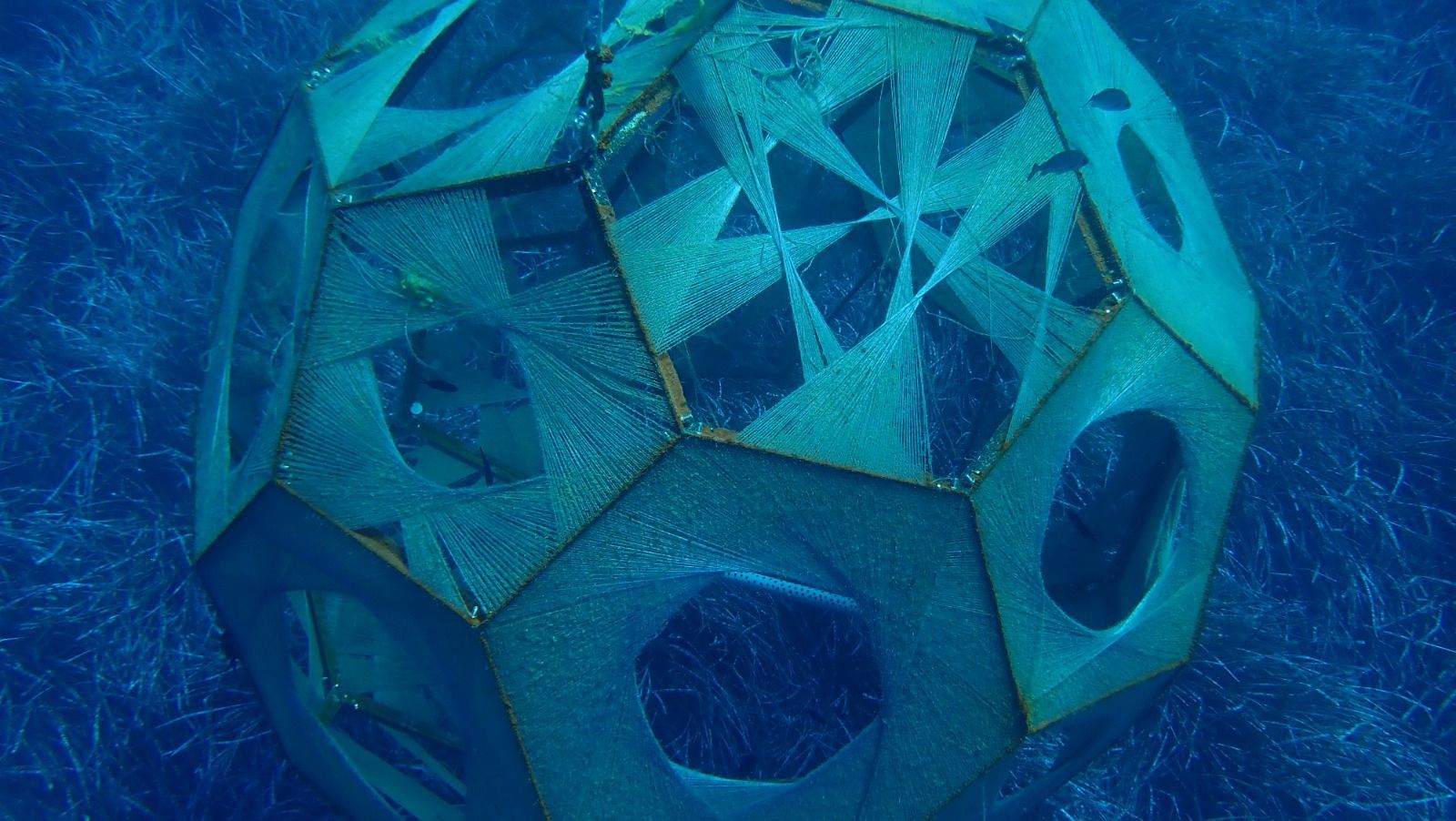KIKI
REEF PROTOTYPE
IN STARESO
Kiki« is the prototype of an artificial reef that provides a substrate and structure for pioneer organisms to form a habitat in the Mediterranean. It is based on the process mineral accretion in seawater by electrolysis, consists of conductive steel yarn and steel frames and is powered by a solar panel on land. During a six-month monitoring phase, the prototype was submerged in the bay of the marine biology research station STARESO - Station de Recherches Sous-marines et Océanographiques de Calvi in Corsica (FR).
The structure was created through the engagement of various participants who all contributed to its realization. At the pier of the scientific research station, marine biologists, divers, and even children were involved in weaving and assembling the large-scale prototype. The process could be described as a way of »weaving together« - as a shared co-design experience for the participants to literally weave together, but beyond that, the work interweaves the biological with the sociological dimension. After »Kiki’s« immersion in the bay, supported by a team of six divers and a boat, the structure was anchored at minus 10 meters and connected to a solar panel on land.
We might ask: Can design play an active role in the origin of life and thus influence the evolutionary history of the sea itself?
In 1970, the architect and self-taught oceanographer Wolf Hilbertz developed the »Biorock« principle in collaboration with the biochemist Tom Goreau. The material technology activates the accretion of seawater minerals on steel structures through electrolysis. By placing a positive and a negative pole in marine environments under low voltage current (the prototype »Kiki« acts as the negative pole), the technology enables the accumulation of limestone on conductive steel structures. Limestone is an ideal substrate for marine organisms and is therefore often used in the restoration of coral reefs. Hilbertz also dealt with his technology on a theoretical level by repeatedly fantasizing about a cybernetic system and omnipotent role of the designer in his academic reflection – named »cybertecture«. The designer as helmsman (ancient Greek kybernetes = helmsman) suggests the vision of a human-made and controllable evolutionary history in which evolutionary events can be steered.
The theory of symbiogenesis by Lynn Margulis forms an antithesis to the cybernetic model proposed by Hilbertz. The pioneering biologist Margulis, who has coined a completely new tradition of thinking about symbiotic relationships (in contrast to the neo-Darwinian idea of »survival of the fittest«), places the interdependence of all species at the center of her theory as an essential element of evolutionary history.
From a design perspective, it therefore seems necessary to ask: How structured, chaotic, centralized or symbiotically interwoven can the design of habitats be?
The »Biorock« technology remains controversial among marine biologists. Critical voices point to the accelerated growth of the corals due to the system and the resulting increased porosity of the coral bodies, which makes them less resistant to storms and anthropogenic influences. In addition, the system requires a large amount of hidden energy resources (constant 12 volts), which is particularly challenging for its deployment in countries of the Global South. The prototype serves as a tangible critical examination of the technology and the topos of human stewardship in the ocean. »Kiki« offers a vantage point on the phantasm of human hubris that suggests that the designer alone can create a controlled environment for the emergence of life.
»Kiki« remained in the Mediterranean for six months, slowly transforming into a habitat for various types of marine life. The prototype illustrates the collaboration with marine life, but also grapples with ocean forces, the seasons in the Mediterranean and significant time spans. In November 2023, »Kiki« was taken by a Corsican storm that tore the structure to pieces. The queer art of failure. To be continued.
CREDITS: Kiki reef prototype in STARESO. rasaweber.com. Photo: Stéphane Jamme, @stepp_aquanaute. Diver: Noemie Chabrier. Location: STARESO (FRR), 2023.
Credits
Design & Research: Rasa Weber
Camera: Rasa Weber
Date: June 2023 - November 2023.
Location: STARESO - Station de Recherches Sous- marines et Océanographiques de Calvi
Corsica (FR)
Biorock technique: Thomas Goreau
Wolf Hilbertz (1970)
Material: laser cut steel frames
conductive steel yarn
Divers: Noemi Chabrier
Sylvain Coudray
Arnaud Boulenger
Sandra Bracun
Stéphane Jamme
Leonie John
Michael Karle
Mathieu Kelhetter
Michaela Roger
Bram van der Schoot
Kelly Stiver
Rasa Weber
Anja Wegner
Lena Wesenberg
Aubin Woehrel
Collaborators: Jordan Lab -
Max Planck Institute
of Animal Behavior
Zurich University of the Arts
Linz University of Art and Design
Matters of Activity
Cluster of Excellence
Humboldt University of Berlin
Anja Wegner
(biologist Jordan Lab)
Internship: Mathieu Kelhetter
(Design Academy Eindhoven, NL)
Photographers: Noemi Chabrier
Sandra Bracun
Stéphane Jamme
Mathieu Kelhetter
Michaela Roger
Kelly Stiver
Rasa Weber
Aubin Woehrel
Sponsoring: Imattec, Bekaert, KiangFiber.
Grant Support: Traveling Grant University of Art
and Design Linz (AT)
PROCOPE
(Government of France-Embassy
of France in Germany/DAAD)
rasaweber.com © 2023
All rights reserved.






























SYMBIOCEAN
DESIGN & RESEARCH Rasa Weber
HOSTING UNIVERSITY Zurich University of the Arts &
University of Art and Design Linz
SUPERVISORS Karmen Franinović (Interaction Design) &
Karin Harrasser (Cultural Studies)
RESEARCH ASSOC. Matters of Activity. Cluster of Excellence I Humboldt University of Berlin
COLLABORATORS Jordan Lab I Max Planck Institute of Animal Behaviour
STARESO: Station de Recherche Océanographiques et sous-marines I Calvi (FR)
TBA 21: Thyssen-Bornemisza Contemporary
BLUE: Multispecies Ethnographies for Oceans in Crisis (Aarhus University)
EXTENDED
COLLABORATORS Polynesian Institute for Biomimicry (FR) I François Briant
Paraiso Dive Center (COL) I José Uparela
Curaçao Divers (ANT) I Mike Duss
Global Coral Reef Alliance I Prof. Dr. Thomas Goreau
Andry Carrasquilla - design (COL)
Ofelia & Jaime Torres - artisanal craft (COL)
Anja Wegner - marine biology (DE)
RESEARCH PROJECT INTERFACING THE OCEAN - Swiss National Science Fund
Zurich University of the Arts I
Interaction
Design
interactiondesign.zhdk.ch/projekte/interfacing-the-ocean/
RESEARCH PERIOD Since 2022 ongoing.
For lectures & collaborations please contact info@rasaweber.com.